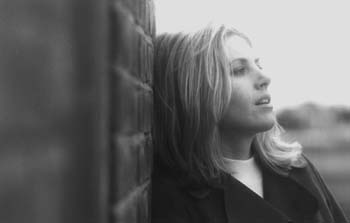![[Metroactive Music]](/music/gifs/music468.gif)
[ Music Index | San Jose | Metroactive Central | Archives ]
 Sunny, Saintly Sarah On her solo album, Saint Etienne's Sarah Cracknell sings about confident, emancipated girls in the city By Michelle Goldberg THE BRITISH BAND Saint Etienne did much to bring '60s pop confectionery back into vogue in the indie world. The group's blend of retro Eurotrash sophistication, dance-club production, breathy vocals and catchy sing-song choruses became a model for all manner of fabulous '90s international ear candy bands, including Pizzicato Five and Stereo Total. Perhaps in reaction to the lo-fi opaqueness of post-rock indie music or because of electronica's glossy influence, the shame that surrounded pure pop in the early '90s has wholly dissipated. Music no longer has to be difficult to be innovative, and the increase in critical attention to commercial music in universities means that it's harder to write off even the most insubstantial Top 40 hit as meaningless. That's why now is a perfect time for the American release of Saint Etienne lead singer Sarah Cracknell's 1997 British solo disc Lipslide (Instinct Records). The songs on Lipslide are, amazingly, even more shiny and accessible than Saint Etienne's music. Here, Cracknell mines more than just the '60s--instead, the album draws heavily on '70s disco, '80s New Wave and '90s trip-pop. Songs like "Anymore" and "Coastal Town" offer an addictive, ABBA-style sugar rush that only the most macho of rock puritans could resist. At the same time, though, much of Lipslide is simply too slick and processed. The only difference between a track like "Desert Baby" and songs by Ace of Bass or the Spice Girls is that those acts' music is more popular. That's the flipside to any acceptance and appreciation of bubble gum: recognizing that just because something is underground doesn't mean it's deep. Shabby Sybarites LIKE MOST GREAT pop bands, Saint Etienne created a fantasy of an idealized lifestyle--in its case, that of a jet-setting shabby-genteel sybarite. Though the music on Lipslide is often more heavily produced than Saint Etienne's, the life conjured by Cracknell's songs is somewhat less stylized and thus easier to relate to. It's the world of a girl tentatively but confidently making her own way in the big city. The best songs suggest a kind of contemporary Mary Tyler Moore plagued less by Fiona Apple-style angst than by brief bouts of loneliness and melancholy alternating with triumph. The first song, "Anymore," tells of self-assured emancipation from a powerful lover. "I don't want tomorrow/I don't want the fuss/I don't need your money/anymore," she croons in her sweet, gauzy voice over a soaring disco soundscape. Like many of the best songs on the album, "Anymore" is dominated by lush strings, keyboards and horns that are jaunty without being aggressive, all deployed in polished, flowing layers. "Anymore" is followed by "Home," a song that suggests the sadder side of independence. A combination of shimmering, glowing synths and Broadway melodies, "Home" is about feeling forlorn and alone, although in the most picturesque, cinematic way possible--Cracknell is creating the soundtrack to her own Breakfast at Tiffany's, not The Bell Jar. "Its two rooms, it's not that much/It's where I keep my stuff, but I call it home," she sings with a kind of boho pride masquerading as modesty. Though the chorus has her pining for a man and singing, "Watching TV/every Friday evening," her cool tone and the upbeat arrangements that accompany it suggest anything but insecurity and desperation. Despite her soft, childlike voice, Cracknell radiates self-sufficiency. That may be why the most heartfelt song on the record doesn't focus on her own problems at all but rather on those of a (weaker) friend. Brimming with sympathy and succor, "Ready or Not" recalls Sarah McLachlan's "Hold On." In both songs, the singers get to play ministering angels; both songs work by making you feel like it's your wounds that are being salved. "Ready or Not" allows Cracknell to express emotion without self-exposure. Musical Bliss UNFORTUNATELY, Cracknell's lack of introspection and corresponding lack of feeling sink several tracks on the album. "Desert Baby" aspires to be something like Everything but the Girl's "Missing"--a yearning love song laid over an effervescent dance track. But both the sentiments and the beats in "Desert Baby" sound generic and tossed off. Here Cracknell isn't exploiting the most delicious aspects of commercial pop; instead, she's falling victim to its worst tendencies. The song isn't just fluffy, it's flaccid. But despite that misstep, Cracknell's carefree, sunshiny album is a tasty antidote to the masochism that runs through much recent girlie pop. In a certain way, Cracknell's like Nancy Sinatra, reveling in three-minute musical bliss while her more talented, profound contemporaries rip their hearts out for our entertainment and edification. Lipslide is music for bright days and vacations, but that's not a bad thing. After all, even smart, jaded sophisticates just want to have fun sometimes. [ San Jose | Metroactive Central | Archives ]
|
From the February 3-9, 2000 issue of Metro, Silicon Valley's Weekly Newspaper.
Copyright © 1999 Metro Publishing Inc. Metroactive is affiliated with the Boulevards Network.
For more information about the San Jose/Silicon Valley area, visit sanjose.com.